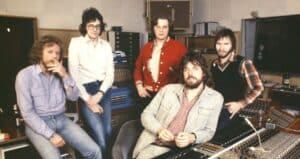Frank Zappa: The Revolutionary Iconoclast of Music
Frank Zappa was an American composer, guitarist, bandleader, and producer whose work spanned many genres, including rock, jazz, classical, and avant-garde music. Known for his complex compositions, satirical lyrics, and technical virtuosity, Zappa was one of the most influential and innovative musicians of the 20th century. His work pushed the boundaries of both music and culture, blending humor, political commentary, and unparalleled musical experimentation.
1. Early Life and Formation
1.1 Born to Challenge: A Musical Prodigy
- Frank Vincent Zappa was born on December 21, 1940, in Baltimore, Maryland, USA. Raised in a family that valued intellectual and artistic pursuits, Zappa showed early interest in music, particularly in classical music and jazz. His eclectic tastes would shape his career, from avant-garde compositions to biting social commentary.
- Zappa started playing guitar at the age of 12, and by his teenage years, he was experimenting with recording techniques and composing his own music. His exposure to artists like Edgard Varèse, Stravinsky, and Igor Stravinsky significantly influenced his approach to music.
1.2 Early Bands and Influences
- Zappa’s early band experiences included The Blackouts (a doo-wop group) and The Soul Giants, where he began to develop his skills as a composer and bandleader. In 1964, he moved to Los Angeles, where he formed his first serious musical project, The Mothers of Invention.
2. The Mothers of Invention: The Birth of an Iconic Band
2.1 The Formation of The Mothers of Invention (1964)
- The Mothers of Invention was formed in 1964, a key turning point for Zappa. The band’s name itself was a reflection of Zappa’s irreverent approach to art, and it would go on to become one of the most iconoclastic and experimental groups of the 1960s and beyond.
- Zappa was the primary composer, and the band’s lineup constantly changed, which allowed him to explore various musical directions. The band combined rock, jazz, classical music, and avant-garde experimentation with sharp, satirical commentary on American society, politics, and culture.
2.2 Freak Out! (1966) – A Landmark Debut
- Freak Out! (1966), the debut album by The Mothers of Invention, was a groundbreaking record in experimental rock. It was one of the first double albums in rock history and broke new ground by blending psychedelic rock, doo-wop, and avant-garde music.
- The album was an ambitious social critique, challenging conformity, and introducing Zappa’s unique satirical voice.
- Key Tracks:
- Hungry Freaks, Daddy
- I Ain’t Got No Heart
3. Experimental Years and Evolution of Sound (1960s-1970s)
3.1 We’re Only in It for the Money (1968) – The Satirical Masterpiece
- Released in 1968, We’re Only in It for the Money (1968) was another crucial album in Zappa’s career. This album was a bold satire of both the counterculture and mainstream society, using humor to address issues like corporate culture, hippie ideals, and political conformity.
- Musically, the album showcased dissonance, polyphony, and a wide range of influences, including jazz, classical, and avant-garde techniques.
- Key Tracks:
- Who Needs the Peace Corps?
- Mother People
3.2 Hot Rats (1969) – A Step into Jazz Rock
- Released in 1969, Hot Rats marked a shift towards a more jazz-influenced sound, moving away from the satirical rock of Freak Out! and We’re Only in It for the Money.
- The album featured a more instrumental style and showcased Zappa’s virtuosity as a guitarist, particularly on the iconic track Peaches en Regalia. Hot Rats has since become one of Zappa’s most beloved albums.
- Key Tracks:
- Peaches en Regalia
- Willie the Pimp
4. Zappa’s Prolific Output in the 1970s: A Career Spanning Genres
4.1 Apostrophe (‘) (1974) – A Major Commercial Success
- In 1974, Zappa released Apostrophe (‘), an album that achieved significant commercial success and introduced a more mainstream rock sound. The album featured more structured, radio-friendly songs but still carried Zappa’s characteristic wit and musical complexity.
- One of the most well-known tracks from the album, Don’t Eat the Yellow Snow, became a fan favorite.
- Key Tracks:
- Don’t Eat the Yellow Snow
- Cosmik Debris
4.2 One Size Fits All (1975) – Zappa at His Peak
- One Size Fits All (1975) is considered by many to be one of Zappa’s greatest achievements. This album fused rock, jazz, blues, and prog with Zappa’s signature satirical lyrics. The tight, intricate compositions, as well as extended instrumental sections, made it a fan and critical favorite.
- The album is a testament to Zappa’s ability to blend diverse musical styles while maintaining an intensely personal and politically charged voice.
- Key Tracks:
- Inca Roads
- San Ber’dino
5. Later Career: Expanding into More Avant-Garde Territory (1980s-1990s)
5.1 Joe’s Garage (1979) – A Rock Opera Masterpiece
- Released in 1979, Joe’s Garage (1979) is a rock opera that explores the world of censorship, political power, and social control through a satirical narrative. The album is an ambitious mix of rock, jazz, and orchestral arrangements.
- Joe’s Garage helped solidify Zappa as a master of blending humor with dark social commentary.
- Key Tracks:
- Joe’s Garage
- Catholic Girls
5.2 The Perfect Stranger (1984) – Classical and Avant-Garde
- In 1984, Zappa released The Perfect Stranger, an album that showcased his more avant-garde and classical influences. The album features orchestral arrangements and a more intellectual approach to composition, reflecting Zappa’s deep admiration for classical music and his ability to meld it with modern rock elements.
- Key Tracks:
- The Perfect Stranger
- Night School
6. Zappa’s Legacy and Influence
6.1 A Revolutionary Voice in Music
- Frank Zappa’s music spanned genres and defied conventions, influencing countless artists across multiple genres. His ability to mix rock, classical, jazz, avant-garde, and electronic music set him apart as one of the most innovative and prolific musicians in history.
- Zappa’s technical mastery as a guitarist and virtuoso composer made him a highly respected figure in the music world. His satirical lyrics also made him a cultural critic, challenging societal norms and exposing hypocrisy, often with biting humor.
6.2 Influence on Modern Music
- Zappa’s influence extends across a wide range of artists and genres, from punk rock to , metal, experimental music, and beyond. His impact can be seen in the work of bands like Tool, Primus, Frank Turner, and even in more experimental circles like Radiohead and The Mars Volta.
- Zappa’s music continues to inspire musicians to push boundaries, experiment with form, and tackle complex themes in their lyrics and compositions.
7. Zappa’s Discography Overview
Studio Albums:
- Freak Out! (1966)
- We’re Only in It for the Money (1968)
- Hot Rats (1969)
- Apostrophe (‘) (1974)
- One Size Fits All (1975)
- Joe’s Garage (1979)
- The Perfect Stranger (1984)
- Jazz from Hell (1986)
- Civilization Phaze III (1994)
Live Albums:
- Roxy & Elsewhere (1974)
- Zappa in New York (1978)
- You Can’t Do That on Stage Anymore (1988-1991)
Frank Zappa’s legacy as a revolutionary artist and cultural commentator remains unmatched. His ability to blend satire with musical mastery made him an icon of counterculture, and his diverse musical output continues to influence generations of artists.




